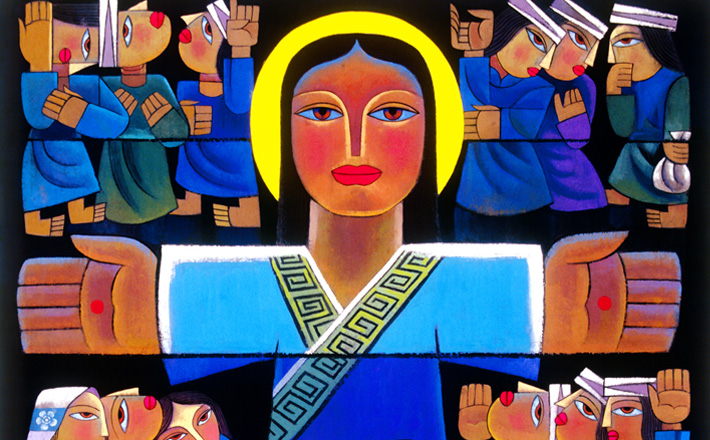Commentary on Acts 10:34-43
How does the resurrection change things?
One scholar states that Acts tells the story of the early church carrying forward “divinely initiated social change” that results from their witness to the resurrected Lord.1 Peter’s speech in Acts 10:34-43 witnesses to no mere social change; it witnesses to a tectonic shift that disrupts the landscape. Peter expresses the issue in Acts 10:28 — “You yourselves know that it is unlawful for a Jew to associate with or to visit a Gentile.” This reality is about to change for Peter. When Christ takes place as Lord of all, other things are decentered — even what we once knew as normative and “lawful.”
More than Limitless Love and Acceptance
Peter’s initial statement in verses 34-35 has two parts, a negation and an affirmation. Most interpreters’ eyes are drawn to the first part — the negation — but not always the second — the affirmation. However we interpret the statement about God’s impartiality, it is important to allow it to challenge our own presumptions, and important that we do not isolate it from the rest of Peter’s statement in verse 35.
In Peter’s speech, God’s impartiality has very little to do with God’s loving acceptance of all people. This is not to say that God does not love, but we do not want to turn Peter’s statement in Acts into something particularly Johannine or Pauline. Indeed, one mines Acts in vain to find support for mention of God’s love. One can try to put this into the sphere of God’s love, but that would risk emphasizing a component of God’s acceptance that Acts does not emphasize.
It is important to continue with Peter in verse 35: “but in every nation anyone who fears (God) and does what is right is acceptable to (God).” Taken together with verse 35, Peter’s point is that ethnic identity cannot define who can rightly fear God and work justice (“work dikaiosune” or “do what is right”).
Peter’s realization finds its meaning amid first century life that thrived on ethnically defined distinctions. It was common to define God’s favored in terms of ethnic association and demarcate the “ethical” and the “just” along the same lines. Non-participation in Greek life and culture revealed one as unlearned in divine things and unvirtuous; those who were not yet graced by Roman life, law, and order remained theologically misguided barbarians.
Several Second Temple Jewish writings equate participation in Judaism (keeping the law and worship of the one God) with the pursuit of virtue and working of justice (dikaiosune). In other words, right living in relation to all things divine and human was found within Judaism. Gentiles, because they are not of Abraham’s seed, cannot participate — either experience the benefits of God’s blessing or be among those who brings God’s light to the world.
Peter’s divinely initiated realization significantly reframes the understanding of divine acceptance in the first century. Peter’s speech concerns not the extent of God’s love, nor how one can be saved (“faith vs. works”), but who can participate in the community that witnesses to God’s salvation. Salvation in Acts means the establishment of God’s peace and justice on earth. In other words, Peter’s new realization addresses the locus and nature of God’s salvific activity in a context where this is usually defined by ethnic group participation.
Peace through Jesus Christ
Peter’s summary of the logos about Jesus in verses 36-43 functions as the replacement narrative to this ethnically constructed way of evaluating humanity. This logos concerns peace through Jesus Christ, Lord of all, who was empowered by the Holy Spirit and who worked good deeds, healing all those oppressed by the devil. According to Peter, it is “because God was with him” that Jesus was compelled to do these things. This calls to mind Jesus’ mission in Luke 4:18-19:
The Spirit of the Lord is upon me,
Because he has anointed me
To bring good news to the poor;
He has sent me to proclaim release to the captives
And recovery of the sight to the blind,
To let the oppressed go free,
And to proclaim the year of the Lord’s favor.
If, as Acts emphasizes, Jesus calls his followers to be his witnesses, then Peter’s summary and Jesus’ citation of Isaiah 61 in Luke 4 provide the essential skeleton of that witness. The locus and nature of God’s work are defined by Jesus’ mission and community of disciples bearing witness to it, not by participation in one particular ethnically defined existence.
Reevaluating Life
Because expressions of ethnic identity in the ancient world involved claims to ethical superiority, we cannot draw the line of this text’s significance at God’s acceptance of all races and ethnicities. We must go further. Why is it no longer “unlawful” for Peter to eat with Gentiles? Because Gentiles’ value before God and ability to witness to Jesus is no longer determined by participation in ways of living particular to certain ethnic or social groups, but by Christ’s mission. As Paul puts it, we no longer evaluate “from a human point of view” (2 Corinthians 5:16).
God’s initiative challenges us to live and think as if others’ ways of living — not just of different ethnic groups, but of those less educated or of a different political persuasion — can display the fear of God and working of justice in their own ways and contexts, without thinking they need to be informed about the correct ways to do it by “us” who think we might have the upper hand on understanding God’s ways. We are forced to consider the narrowness and short-sightedness of our own vision and the breadth and depth of God’s.
It is also important to recognize that Peter’s speech does not serve to relativize ethnic identity and manner of life so that they become arbitrary or insignificant. Peter’s speech actually confesses the value of ethnic and social particularity in service to God’s mission in Christ. The “other” need not become like me; likewise, I should feel no compulsion to change. In Peter’s speech, the resurrection brings a new reality where Jew and Gentile as themselves contribute to a diverse witness to God’s mission in Christ.
Jesus is risen indeed! This message gives eternal hope. In this week’s text, however, the resurrection also shakes the present world, bringing a new outlook. As we proclaim the promise of the resurrection, let us also proclaim the power of the resurrection, a power that changes how we evaluate who can fear God and work justice in Jesus’ name.
1Ben Witherington III, The Acts of the Apostles: A Socio-Rhetorical Commentary (Grand Rapids: Eerdmans, 1998), 21.


March 31, 2013